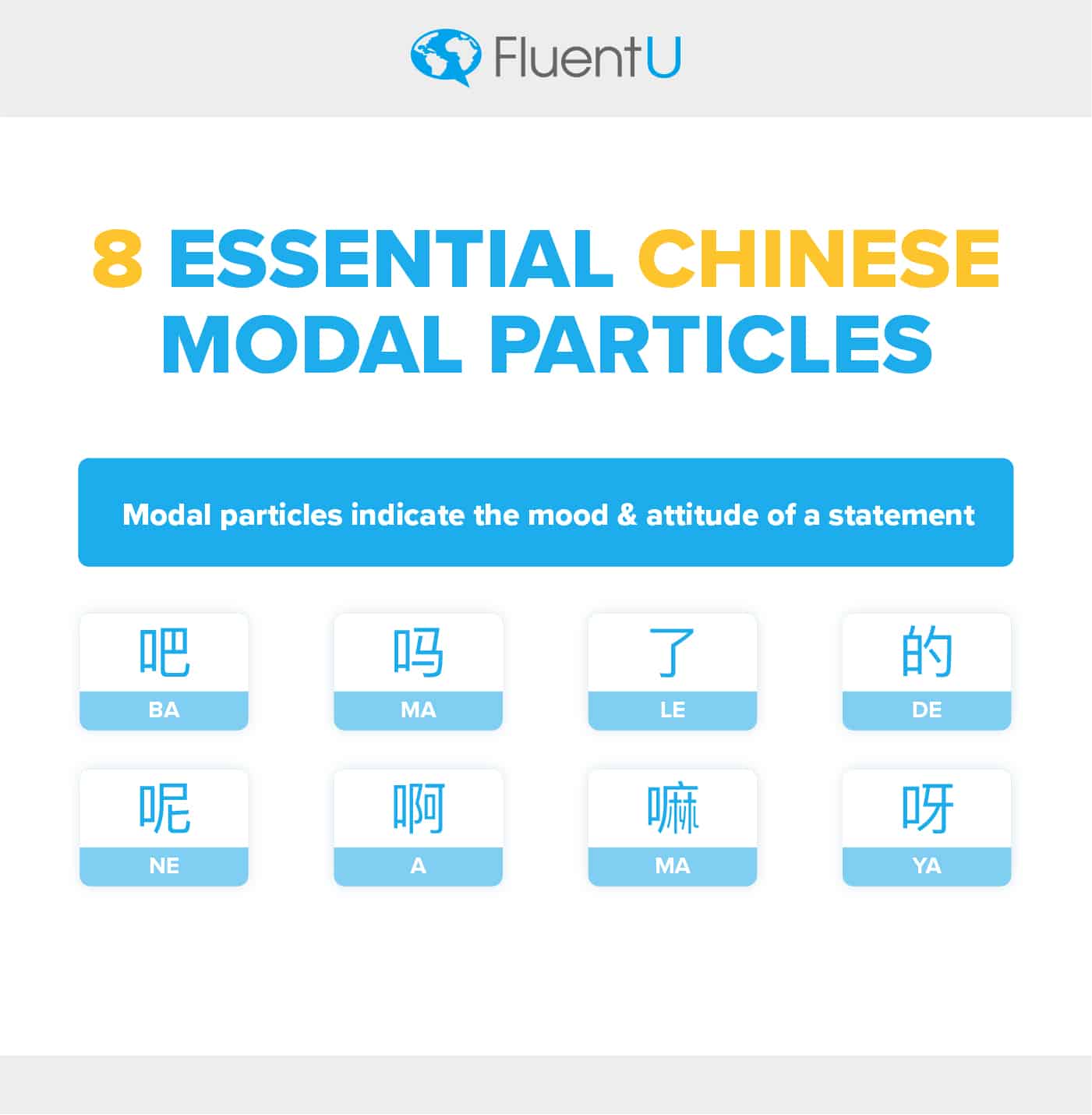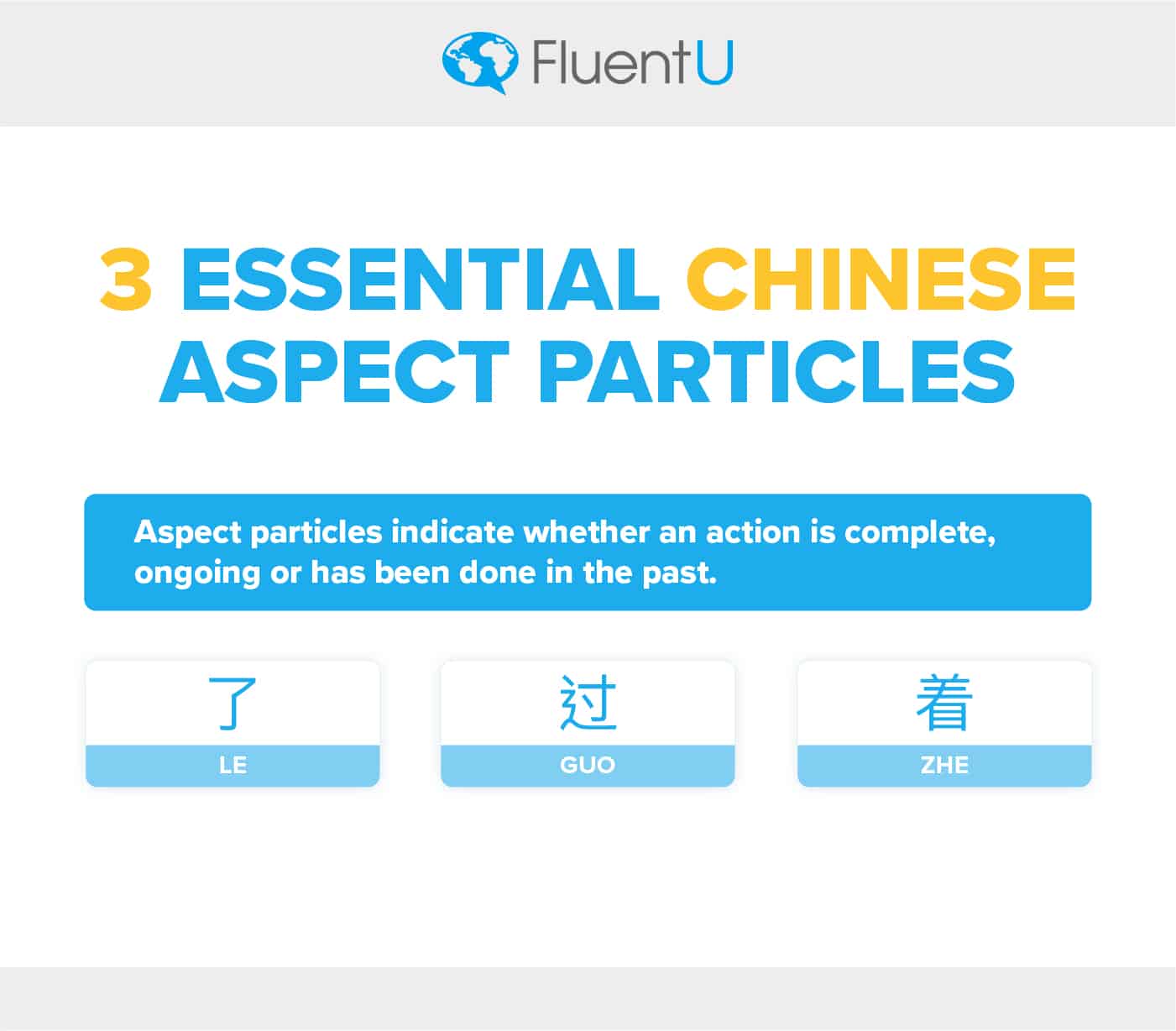
Chinese Particles: What They Are and How to Use the Most Important Ones
If I asked you to name the parts of speech, could you name all of them?
Nouns. Verbs. Adjectives. Adverbs. Pronouns. Prepositions. Conjunctions. Determiners. Interjections.
Those are the nine parts of speech that we learned about in school. So imagine my surprise when I first came across particles in Chinese.
“Chinese particles? Do I even know what particles are in English?!”
As it turned out, I did know what particles were. I just didn’t know there was a name for them. It was the same for Chinese, and I bet you already know at least a couple of them as well.
So, read on for exactly what Chinese particles are, 11 of the most important ones and why it’s important to learn them.
Contents
- What Are Chinese Particles?
- Modal Particles in Chinese
- Aspect Particles in Chinese
- Why Learning Chinese Particles Is Important
- And One More Thing...
Download: This blog post is available as a convenient and portable PDF that you can take anywhere. Click here to get a copy. (Download)
What Are Chinese Particles?
The word “particle” makes it seem like the concept is much more difficult than it actually is. But in fact, it’s no more challenging than some of the most fundamental Chinese grammar rules.
Believe it or not, you’ve probably been using particles all along—you just haven’t realized it!
Take 的 (de) for instance. At this point, you recognize that 的 is used to indicate possession, where “my dog” in Chinese would be 我的狗 (wǒ de gǒu).
的 also functions as a particle in Chinese. We’ll cover it below.
As you know, spoken Chinese is a tonal language, where we find meaning through the tone of a syllable or word.
Unlike most characters, Chinese particles take the neutral tone and therefore have no meaning on their own. Their meanings depend on context, and the addition of a particle can alter a statement in a couple different ways.
In other words, Chinese particles are function words that determine the overall tone or duration of a statement.
We’ll be covering two types of particles in this post:
- Modal particles, which express mood or attitude.
- Aspect particles, which indicate how a verb relates to or works within a certain timeframe.
So, let’s go over the most commonly used modal and aspect particles to help you improve your Chinese fluency!
Modal Particles in Chinese
To reiterate, Chinese modal particles are function words that can determine the attitude or mood of a statement.
There are loads of modal particles out there, and some can even combine to form new ones, but we won’t worry about those.
Instead, we’ll go over the modal particles, or 语气助词 (yǔ qì zhù cí), you’ll most likely use in everyday speech.
1. 吧 (ba)
The modal particle 吧 can be used in three different ways.
Not to be confused with the Mandarin Chinese 把 (bǎ) construction, which is placed between a subject and an object, the particle 吧 follows after a statement or a command. Thus, 吧 appears at the end of a sentence or clause.
First, 吧 can be used to make a suggestion with this pattern: Command + 吧.
Using 吧 lightens the tone of a command by turning it into a suggestion or alternative solution. You can think of 吧 as “then,” as in this example:
那我们去别的地方吃饭吧。
(nà wǒ men qù bié de dì fang chī fàn ba.)
Let’s eat somewhere else then.
Second, 吧 can be used to express “all right” or “fine then” in response to someone with: Statement + 吧.
When you want to respond by conceding (as in answering “all right then” to a yes-or-no question), you can do so in this way:
A: 我们可以早点离开聚会吗?
(wǒ men kě yǐ zǎo diǎn lí kāi jù huì ma?)
Can we leave the party early?
B: 好吧,我们九点钟离开。
(hǎo ba, wǒ men jiǔ diǎn zhōng lí kāi.)
All right, we’ll leave at nine o’clock.
Third, 吧 can make something sound more polite with a similar construction: Statement + 吧.
If you want to kindly tell someone to do something, feel free to add 吧 to the end of the statement or command. 吧 can translate to “please” in this case:
快点吧,我不想迟到。
(kuài diǎn ba, wǒ bù xiǎng chí dào.)
(Please) Hurry up. I don’t want to be late.
2. 吗 (ma)
Another one of the grammar points you learn as a beginner is the use of “ma” in Chinese, so you might already know how 吗 functions as a modal particle.
To start, 吗 can be used to turn statements into yes/no questions with the structure: Statement + 吗 + ?
The way to form yes-or-no questions in Chinese is simply tacking 吗 on at the end of a statement:
你明天晚上有空吗?
(nǐ míng tiān wǎn shang yǒu kòng ma?)
Are you free tomorrow night?
You can also use the modal particle 吗 to ask for confirmation. In English, that would be the equivalent of asking “right?” or “correct?” Here’s an example:
你父母要去,对吗?
(nǐ fù mǔ yào qù, duì ma?)
Your parents are going, right?
3. 了 (le)
When the Chinese 了 is used as a modal particle, it shows a change between a past and present state or circumstance. It’s placed at the end of a statement.
First, the particle 了 can differentiate between a past and current state in the pattern: Adjective + 了.
If you want to point out a change in a noun’s mental, emotional or physical state, the adjective in the sentence should be followed by 了. Basically, 了 implies that a noun is or feels different from before, as in:
我需要休息,我累死了。
(wǒ xū yào xiū xi, wǒ lèi sǐ le.)
I need to rest. I’m exhausted.
了 can also differentiate between a past and current situation when used as: Verb + 了.
If you want to indicate that something that is true now wasn’t true before, you can attach 了 to the end of the relevant verb.
To make it easier to remember, you can think of this construction as a “used to… but now…” sentence in English, where 了 would roughly translate as “but now,” like this:
老公以前讨厌慢跑,现在喜欢了。
(lǎo gōng yǐ qián tǎo yàn màn pǎo, xiàn zài xǐ huān le.)
My husband used to hate jogging, but now he likes it.
Finally, you can use 了 to describe a sudden change in the weather:
看,下雪了!
(kàn, xià xuě le!)
Look, it’s snowing!
4. 的 (de)
This form of the Chinese “de” has a lot of usages. Although not all of them qualify as modal particle functions, we’ll go over everything for clarity.
First, 的 can be used to indicate possession in the structure: Noun + 的.
的 can be placed after personal pronouns to turn them into possessive pronouns. This use of 的 also demonstrates possession in general, such as a noun belonging to another noun:
我的妈妈比我的爸爸高。
(wǒ de mā ma bǐ wǒ de bà ba gāo.)
My mom is taller than my dad.
Next, 的 can help describe nouns when used in this pattern: Adjective + 的 + Noun.
So you can use 的 to connect adjectives to nouns by placing it in between the descriptive word and the noun:
她有最可爱的猫。
(tā yǒu zuì kě ài de māo.)
She has the cutest cats.
的 can also be used to create a verbal phrase: Verb + 的 + Noun.
If you want to use a verbal phrase, or use an -ing verb as an adjective for a noun, then you place 的 in between the verb and noun. A verbal phrase would be something like “talking dog,” which in Chinese would be 说话的狗 (shuō huà de gǒu):
电影里有只会说话的狗。
(diàn yǐng lǐ yǒu zhī huì shuō huà de gǒu.)
The movie has a talking dog.
Finally, you can use 的 as a modal particle to add certainty to a statement, as in: Statement + 的.
If you want to show confidence in what you say, you can add the modal particle 的 at the end of your statement:
是真的, 我看到了。
(shì zhēn de, wǒ kàn dào le.)
It’s true, I saw it.
5. 呢 (ne)
The Chinese 呢 can be used at the end of questions and statements.
First, you can use 呢 to ask “how/what about” questions using this structure: Subject + 呢 + ?
When you want to ask a “how/what about” question as a follow-up to a statement, simply add 呢 after the subject that’s being addressed:
我不喜欢芦笋,你呢?
(wǒ bù xǐ huān lú sǔn, nǐ ne?)
I don’t like asparagus. How about you?
呢 can also be used to demonstrate confidence or conviction with: Statement + 呢. In this instance, 呢 is always placed at the end of the sentence:
他不会准时到达呢。
(tā bú huì zhǔn shí dào dá ne.)
He won’t make it on time.
6. 啊 (a)
啊 elevates the emotion or sentiment of a statement. It’s included at the end of the sentence or question.
So, to emphasize excitement or exclamation with 啊, use the pattern: Statement + 啊. This allows the speaker to express amazement or pleasant surprise:
你在做什么菜?好香啊!
(nǐ zài zuò shén me cài? hǎo xiāng a!)
What (food) are you making? It smells amazing!
啊 can also show urgency when used as: Statement/Question + 啊.
If you need to warn someone or just generally tell them to watch out, you can place 啊 at the end of your statement or question to demonstrate a sense of urgency:
小心台阶啊!
(xiǎo xīn tái jiē a!)
Watch your step!
7. 嘛 (ma)
This particle is probably one that you haven’t encountered yet, but nonetheless, it’s a fun one to use in conversations.
First, 嘛 can be used to state a topic: Topic + 嘛.
This modal particle can introduce a topic of conversation. After you say the topic, follow it up with 嘛, and then express your opinion or thought on said topic:
泡黄瓜嘛,你要么喜欢,要么恨。
(pào huáng guā ma, nǐ yào me xǐ huān, yào me hèn.)
Pickles—you either love them or hate them.
Next, 嘛 can be used to state the obvious with the structure: Statement + 嘛. It’s essentially like saying “duh” in English! Take a look:
他们一整天没吃东西,当然饿嘛。
(tā men yì zhěng tiān méi chī dōng xi, dāng rán è ma.)
They haven’t eaten all day. Of course they’re hungry.
8. 呀 (ya)
呀 works very similarly to 啊 in the way that it heightens the emotion of the statement. The main difference is that 呀 is more commonly used among younger people. I like to think of 呀 as the informal, melodramatic version of 啊.
You can use 呀 to express excitement or exclamation with the pattern: Statement/Question + 呀. So when you’re really anxious for an a response to something, add 呀 to the end of your question:
A: 我有一个新女朋友。
(wǒ yǒu yí gè xīn nǚ péng yǒu.)
I have a new girlfriend.
B: 是谁呀?
(shì shéi ya?)
Who is it?
And if 啊 doesn’t quite reflect how excited or antsy you are, end your statement with 呀 instead:
快来呀!
(kuài lái ya!)
Come on!
Aspect Particles in Chinese
Tenses don’t exist in Chinese. Instead, the language relies on aspect particles.
Aspect particles are function words that come after the verb in a sentence to determine the state of the action. Different aspect particles indicate whether an action is complete, has been done in the past, is ongoing, etc.
Confused? Don’t worry. Many aspect particles, or 时态助词 (shí tài zhù cí), are very similar to the tenses we have in English.
9. 了 (le)
Look familiar? As you can see, 了 works both as a modal particle and an aspect particle. When it’s an aspect particle, 了 is attached to the verb rather than placed at the end of the statement.
So, to indicate that an action is complete, use the structure: Verb + 了. You can think of 了 as tacking on “-ed” to the end of verbs in English to turn them into the past tense, like these examples:
她吃了整个披萨。
(tā chī le zhěng gè pī sà.)
She ate the whole pizza.
今天早上他去了超市。
(jīn tiān zǎo shang tā qù le chāo shì.)
He went to the supermarket this morning.
10. 过 (guo)
A special note here: When this word uses the fourth tone, 过 is a verb that means “to cross.” But when paired with another verb as an aspect particle, 过 means something different.
You can use the aspect particle 过 to show that an action has been done in the past: Verb + 过 + Object.
This pattern is used when an action has been completed at an indefinite time in the past. This is pretty much how we understand the present perfect tense in English:
你去过哥斯达黎加吗?
(nǐ qù guo gē sī dá lí jiā ma?)
Have you ever been to Costa Rica?
她看过这电影很多次了。
(tā kàn guo zhè diàn yǐng hěn duō cì le.)
She has watched this movie many times.
11. 着 (zhe)
This one might be a bit of a head-scratcher since this particle is used to express an ongoing action but not an action that’s currently in progress. I’ll break it down for you.
着 is used to express a continuous action with the pattern: Verb + 着.
Again, this is not the way to translate -ing verbs in Chinese. Rather, 着 implies that one action happens simultaneously with another action.
If it helps, you can think of this as the conjunction “while” in English. Note that 着 only follows the verb in the “while” clause:
你洗着碗,我做晚饭。
(nǐ xǐ zhe wǎn, wǒ zuò wǎn fàn.)
I’ll cook dinner while you wash the dishes. / I’ll cook dinner, you wash the dishes.
你点着菜,我停车。
(nǐ diǎn zhe cài, wǒ tíng chē.)
I’ll park the car while you order food. / I’ll park the car, you order food.
Why Learning Chinese Particles Is Important
Because particles don’t fall under the main parts of speech, you might not think they’re all that important to learn.
However, chances are you’ve already encountered them in lessons or tutoring sessions, TV shows or movies, language meetups, etc. Particles are part of everyday conversations as small words that come naturally in speech.
While they can’t be defined per se, they still have a lot to offer in terms of grammar. The grammatical functions of Chinese particles are arguably just as important as the other sentence elements.
You saw above how Chinese particles can change the meaning of sentences. So while you might be fine and dandy never knowing what particles are in English, the same can’t be said in Chinese. Take your time getting to know the particles, and then practice using them.
There are plenty of practice options. For instance, you can:
- Look for particles when you read. Whether you’re reading a textbook, a novel, a manga or some other Chinese media, you can find examples of particles in use when you read Mandarin to get a sense of how you yourself can use them properly.
- Listen for particles in podcasts or videos. If doing this on your own is too intense, you can consider using a program like FluentU.
- Use particles in your conversations. Beginner, intermediate and advanced Chinese learners alike can practice using particles when speaking. If you have a language partner, you can even let them know you’d like to practice particles and get some native speaker feedback right away.
After all, when you can successfully use some Chinese particles in daily conversations, you’ll gain some major fluency points among native speakers!
As you can see, Chinese particles play a bigger role in language than you might’ve noticed in the past, if at all.
Now that you know how to use these particles, you’re one step closer to Mandarin fluency!
And One More Thing...
If you want to continue learning Chinese with interactive and authentic Chinese content, then you'll love FluentU.
FluentU naturally eases you into learning Chinese language. Native Chinese content comes within reach, and you'll learn Chinese as it's spoken in real life.
FluentU has a wide range of contemporary videos—like dramas, TV shows, commercials and music videos.
FluentU brings these native Chinese videos within reach via interactive captions. You can tap on any word to instantly look it up. All words have carefully written definitions and examples that will help you understand how a word is used. Tap to add words you'd like to review to a vocab list.
FluentU's Learn Mode turns every video into a language learning lesson. You can always swipe left or right to see more examples for the word you're learning.
The best part is that FluentU always keeps track of your vocabulary. It customizes quizzes to focus on areas that need attention and reminds you when it’s time to review what you’ve learned. You have a 100% personalized experience.
Start using the FluentU website on your computer or tablet or, better yet, download the FluentU app from the iTunes or Google Play store. Click here to take advantage of our current sale! (Expires at the end of this month.)







